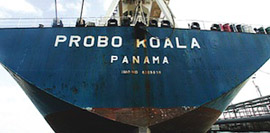| TRAFIGURA'S TOXIC TACTICS | ||||||
The Ivorians show the reporter from Nova TV statements to the London courts, where Trafigura fought claims for compensation from alleged victims. “This is the statement I drew up with Trafigura’s lawyers,” explains one driver who was moving the waste to the dumping grounds. “There are several incorrect paragraphs in this statement. They are false. For example, paragraph 70 reads: ‘During the loading my clothes were stained but I didn’t experience any ill effects.’ That is not correct… Where the stuff touched my skin, I could feel it burn. My skin peeled.” ‘Trafigura wanted us to lie under oath’ Other witnesses tell similar tales. “You could say whatever you want,” a second man says, “except that the product was dangerous, even lethal. The idea was that we would go to England to testify to all who would listen that the waste had no effects on us. Trafigura wanted us to lie under oath.” Yet another man said that if Trafigura won, they would each get thousands of euros. The drivers explain that they went into hiding to escape popular anger after 15 people died and hundreds more were injured. Representatives of Trafigura contacted them and flew them to Morocco. One still has his ticket to confirm his story. He also has a photo of a lawyer from Trafigura’s firm, Macfarlanes. What to make of this? Dutch television’s witnesses asked to remain anonymous. But in 2009 Leigh & Day, the solicitors for Ivorians claiming compensation, accused Macfarlanes of attempting to persuade claimants to change their statements – accusations it later withdrew as part of the overall settlement of the claims. It alleged that Macfarlanes paid for one of the claimants to come to Morocco, where he was met by one of Macfarlanes’ partners, who questioned him for two days and offered inducements to alter his story. ‘We never acted improperly’ Macfarlanes admitted meeting the claimant and paying for his travel, but asserted that it had acted ethically. It feared that Trafigura was facing exaggerated or false claims. But it “never acted improperly or offered any inducements whatsoever to any witnesses or claimants”. To do so, said a spokesman, “would have been obviously wrong and unethical, not to mention unlawful. It would also have been utterly pointless to have offered any inducement to that or any individual, as this would have wholly undermined their evidence when examined in court.” Trafigura also (notoriously) retained Carter-Fuck, which tried to stop the press reporting evidence against the company given under the protection of parliamentary privilege by the Labour MP Paul Farrelly. That attempt to undermine the ancient liberties of England failed, but the use of super-injunctions and threats of libel actions have had a wider chilling effect. Dutch editors now openly pity their British counterparts. They note how Fleet Street gave minimal coverage to Trafigura’s first conviction back in July, when a Dutch court fined Trafigura £840,000 for illegally exporting hazardous waste and ruled that the firm had concealed the dangerous nature of the waste. Meanwhile, the failure of the British press to mention the Nova TV documentary has become a story in itself in Holland. Trafigura threatens Dutch journalists, too, Joop explained to readers. But the huge cost of losing a libel case makes British journalists “reticent”. Aren’t they just? And if you want to see the Nova documentary you should Google “Trafigura” and “vimeo” sharpish before some lawyer hits it with an injunction. Or you can watch the entire film here... |
http://www.private-eye.co.uk/sections.php?section_link=in_the_back&issue=1276

